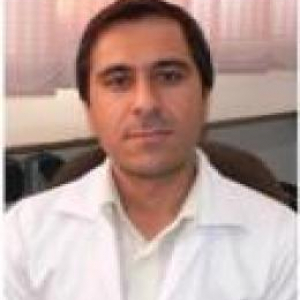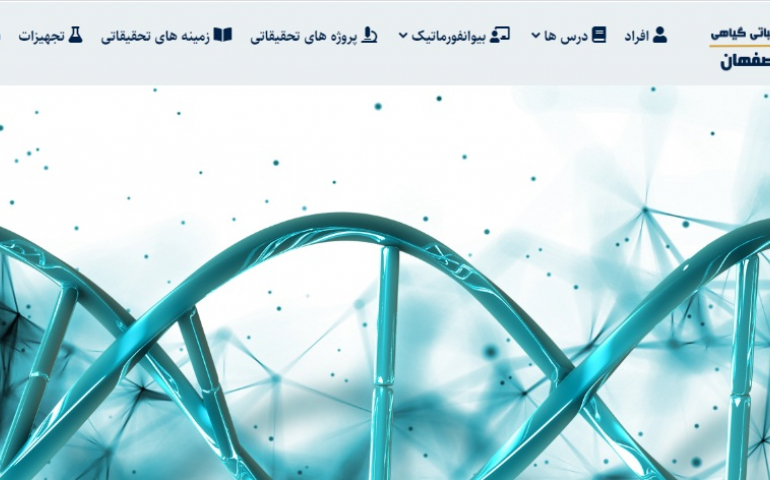Agricultural biotechnology
Department Overview
Biotechnology and its application to agricultural systems have been recognized as a frontier technology for achieving sustainability of the food production in the world. In Iran, biotechnology has been also identified as one of the key strategic technologies aimed at supporting sustainable crop production. Therefore, education in the field of agricultural biotechnology in Iran has been considered as an essential part of planning and performing modern agriculture.
The Department of Biotechnology was founded in 1999 based on a recognition that the future of Iran's agriculture will strongly depend on the incorporation of biotechnology in this field. The department offers graduate study program in agricultural biotechnology. The overall aims of this department are to acquaint students with the latest techniques and advances in agricultural biotechnology with a strong emphasis on understanding the theories, principles, and techniques in different key areas of biotechnology. The MSc and PhD students are instructed to have a clear understanding of molecular genetics, plant cell and tissue culture, molecular markers and genetic engineering and proteomics. The overall aim for MSc and PhD programs are to give the students experience in project management, written and oral presentation of scientific discoveries.
Academic Programs
Our Department provides academic programs for the degree of Master of Science (M.Sc.) and PhD in Agricultural Biotechnology.
Graduate
The Department of Agricultural Biotechnology offers programs for the degrees in Master of Science. Students must pass 32 (including thesis or dissertation) course credits for M.Sc. Graduate students must conduct an original research study for their thesis or dissertation, and defend their findings in an oral and public presentation.
Research Fields
The Department of Agricultural Biotechnology is nationally recognized for its excellence in both the basic and developmental research in agricultural biotechnology. The research activities at this department are focused on both basic and applied sciences including:
- Bioinformatics, Genomics and Transcriptomics
- Genetic diversity of plants
- Genetic engineering
- Molecular basis of offense and defense in plant-fungal interactions
- Plant tissue culture and production of transgenic plants
- Proteomics, protein engineering and protein chemistry
Bioinformatics, Genomics and Transcriptomics
- Bioinformatic methods for the integrated analysis of genomic, transcriptomic, proteomic, metabolomic, and phenotypic information.
- Identification of candidate genes involved in metabolic pathways using new techniques.
- The study of the candidate genes and genetic variation in the quantitative traits.
- Evaluation of gene expression and its relation with different physiological circumstances.
- Investigation of mRNA expression in response to different stresses.
Molecular basis of offense and defense in plant-fungal interactions
Offense and defense are the central and main events occurring during plant-microbe interactions. These processes are sophisticated mechanisms, employed by host plants and invader fungal pathogens during interactions and, thus, the interface between hosts and pathogens is regarded as the molecular battlefield.
Only host plants are attacked by their related fungal pathogens. How this specificity is achieved? The specific recognition of host plants by their particular pathogens is achieved through specific signaling pathways. Once plants are attacked by fungal pathogens, they have to actively defend to survive. Triggering defense mechanisms depends on recognition of invader, which is the first line of defense. Plants are equipped with intelligent systems to monitor nearby pathogens. Recognition might be triggered through PAMP recognition by specific receptors designated as PRR leading to PAMP-triggered immunity. To combat with this layer of defense, pathogens defeat PTI by secreted effectors resulting in Effector-Triggered Susceptibility (ETS).
Plants, in turn, have evolved R protein to resist against pathogen and induce Effector-Triggered Immunity (ETI). The ETI response again is suppressed by other types of fungal effectors. Once recognition is suppressed by pathogens, the offensive process is triggered during which the invaded plants are bombarded with many different molecular weapons called "virulence factors" enabling them to colonize the host tissue.
Through collaborative researches with national and international researchers, we aim to understand how fungal pathogens and host plants sense each other and what are the molecular mechanisms underlying offense and defense using various genetics, genomics, transcriptomics, bioinformatics approaches.
Proteomics and Protein Engineering
The work in proteomics lab aims to identify and functionally characterize the proteins involved in different plant cellular mechanisms. Our research interests particularly focus on the enzymes which are involved in the regulation of cell redox homeostasis such as thioredoxin, superoxide dismutase and the proteins involved in chelation of metals such as metallothionein. Since many gene products of biological interest are naturally produced in minute quantities, it is difficult to study them. To circumvent this problem, one solution is to produce recombinant form of these proteins. Therefore, we use genetic engineering tools for isolation and cloning of genes encoding our proteins of interest. The recombinant proteins are heterologously expressed in prokaryotic or eukaryotic hosts. After protein purification, functional analysis of proteins is performed using protein chemistry and enzyme kinetics techniques along with protein engineering tools such as site-directed mutagenesis.
Genetic diversity and plant tissue culture
This area research have been focused on optimization of plant cell, tissue and organ culture especially in medicinal and horticultural plants.
Research projects
- Transcriptome Landscape Variation in the Genus Thymus (Dr. Soorni)
- The first transcriptome profile of Allium hirtifolium (Dr. Soorni)
- Whole genome duplication in medicinal plants (Dr. Soorni)
- Genetic networks of bolting regulation in spinach (Dr. Soorni)
- Identification of resistance genes in plant using NGS technology (Dr. Soorni)
- Creating transcriptome database for terpene synthetic plants (Dr. Soorni)
- Propagation of Taxus baccata seedling using tissue culture techniques (Dr. Sayed Tabatabaei)
- Azolla domestication (Dr. Sayed Tabatabaei)
- Phenotypic and molecular interactions of wheat-fungal pathogens (Dr. Mehrabi)
- Identification of candidate effector candidates of barley pathogens (e.g. Rhynchosporium commune, Pyrenophora spp. ) (Dr. Mehrabi)
- Identification of effector candidates of wheat fungal pathogens e.g. Cochliobolus sativus, Zymoseptoria tritici, Pyrenophora tritici-repentis (Dr. Mehrabi)
- Genome-wide association mapping of resistance against wheat pathogens (Dr. Mehrabi)
- Identification of resistance genes to important diseases in wheat using molecular markers (Dr. Mehrabi)
- Production and purification of recombinant superoxide dismutase in order to their application in medicine (Dr. Shahpiri)
- Arsenic bioremediation using engineered bacteria (Dr. Shahpiri)
- Plant metallothionein and genetic engineering for bioaccumulation of toxic metals in bacteria(Dr. Shahpiri)
- Establishment of microbial platform using metabolic engineering techniques for production of secondary metabolites (Dr. Shahpiri)
- The use of barley aleurone layer as a model system for plant signaling (Dr. Shahpiri)
- Genetic diversity and population structure of pomegranates using DNA markers (Dr. Talebi)
- Phytoremediation of heavy metals in different Azolla species, molecular aspects (Dr. Talebi)
- Expression analysis of anthocyanin and carotenoid genes in pomegranates (Dr. Talebi)
- Micropropagation and in vitro accumulation of secondary metabolites in some medicinal plants such as Chatarantus roseus and Dracocephalum kotschyi (Dr. Talebi)
- Molecular legume- rhizobium symbiosis (Dr. Talebi)

- 031-33913362







